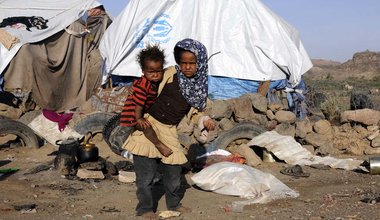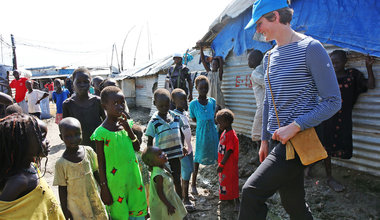As migration continues to accelerate in south-east Asia, UN health agency calls for a focus on migrants’ health
 Noting greater vulnerability of the health of migrant populations, including heightened risks of infectious diseases, malnutrition, substance abuse and maternal and neonatal mortality, the United Nations health agency has urged a regional meeting of health officials in south-east Asia for an increased focus on their health needs.
Noting greater vulnerability of the health of migrant populations, including heightened risks of infectious diseases, malnutrition, substance abuse and maternal and neonatal mortality, the United Nations health agency has urged a regional meeting of health officials in south-east Asia for an increased focus on their health needs.
“Disease is universal and transcends borders. As health leaders we must tackle the health problems that affect migrant populations,” the World Health Organization's (WHO) Regional Director for the South-East Asia Region, Dr. Poonam Khetrapal Singh, said in a news release today.
“We need to construct better information systems to collect data on the health issues of migrants; institute policy and legal frameworks that facilitate greater health care access; and create inclusive health systems sensitive to the needs of migrants,” she added.
According to the news release, health and migration are key concerns of WHO member countries across the region – with Thailand, India, Bangladesh and Indonesia named among the top ten countries witnessing large movements of people in Asia. In addition, WHO notes that migration poses greater risk and vulnerability to infectious diseases, mental health disorders, maternal and neonatal mortality, substance use, alcoholism, malnutrition, violence and non-communicable diseases.
“As migration continues to accelerate at unprecedented levels, we are presented with an opportunity to come together as a region to ensure that migrants are able to access adequate health coverage,” Dr Khetrapal Singh said.
Noting that mobile populations pose additional challenges in countries that are already struggling to cope with day-to-day demands on their health care systems, the UN health agency stated that migrant persons also encounter obstacles to accessing quality health care as provision of health services is contingent on their legal and administrative status.
To address these issues, Dr. Khetrapal Singh highlighted the need for better systems to collect health-related data of migrants, strengthened policy and legal frameworks to increase access to health care, and creation of inclusive health systems that are sensitive to the needs of migrants.
The news release further added that WHO’s regional member countries, meeting at the 69th session of the agency’s Regional Committee for South-East Asia also discussed ways to address regional health issues, including countering the spread of infectious diseases as well as spread of antimicrobial resistance.
The Regional Committee is made up of 11 member countries – Bangladesh, Bhutan, the Democratic People's Republic of Korea, India, Indonesia, Maldives, Myanmar, Nepal, Sri Lanka, Thailand and Timor-Leste – and has been holding its meeting in the Sri Lankan capital of Colombo.
 UN
UN







